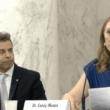The United States is not leaving Paris. Trump is.
June 2, 2017
Given the tragic fact that Donald Trump is president of the United States, I think his announcement of withdrawal from the Paris climate accords is on the whole the better of the outcomes that could have realistically been hoped for. It would be one thing if Trump made use of his famous fickleness to announce a u-turn in his announced climate policies, recognizing that the accords are backed by business and are a benefit both to US world leadership and the US economy. That fantasy announcement might have included a statement that the United States stands by the stated emission reduction targets, but will seek to achieve them by more conservative, market-based means. Given Trump’s manifest attempts to dismantle decarbonization efforts (attempts that will ultimately prove to be futile in the face of overwhelming economic forces to the contrary), however, it would be a travesty for the United States to remain part of the accords. That is because the Paris agreement, like the best of all international agreements, represents a statement of shared goals, to which the signatories have willingly subscribed. That arrangement works, as long as the parties are well-meaning. But having the United States, under Trump, in the accords demeans the whole enterprise and just opens it up to obstructionism and mischief-making by US negotiators. US withdrawal would harm the accords if it prompted an exit by other major emitters who’ve signed the agreement, but so far that does not seem to have happened. If anything, the US withdrawal has strengthened the resolve of China, India, and Europe to hold to actions to fulfill or even exceed their committed emission reduction targets.
Now, a few words on the utter (if unsurprising) stupidity of Trump’s stated arguments for withdrawing from Paris. Some background is provided by Secretary of State Rex Tillerson’s statement emphasizing “the difficulty of balancing addressing climate change … and ensuring that you still have a thriving economy and you can still offer people jobs so they can feed their families… ” Coming from an administration that has proposed to slash funding for food stamps, the sudden tender concern for the ability to put food on the table is jarring to say the least—even leaving aside the glaring neglect of the devastating effect of global warming on food production itself. The president’s own statement is riddled with what we have sadly come to know as alternative facts. He states that the actions in the accord would reduce temperature by only two tenths of a degree Celsius, but this estimate is just the reduction relative to the Copenhagen accords and moreover is what happens if the United States does nothing further than the Paris commitments out to the year 2100. The accords of course anticipate a further round of emissions reductions beyond 2030.
It is true that the Paris accords by themselves are not good enough to keep us under 2 degrees Celsius warming without more stringent reductions after 2030, but compared to “business as usual” exponential growth of emissions, adhering to the Paris accords would still reduce temperatures by maybe as much as 4 degrees C in 2100, depending on what you assume for a “business as usual” growth rate. And that’s just the global average; impacts on polar warming, warming over land, and maximum heat waves would be much greater. Trump’s stated estimates of economic impact of the accords are even worse, based as they are on a report that could be charitably called a case of “alternative-fact economics,” and that fails to account adequately for the damages done by climate change, that assumes no change in business practices in response to policy, that neglects the role of technological innovation, and that fails to adequately reflect economic growth in the energy efficiency and renewable energy sector—a sector that already provides more jobs than coal mining. Trump’s statement also shows a gross (if unsurprising) ignorance of what is actually in the Paris document, e.g. stating that it allows China to build coal plants but not the United States.
Given the long capital life of investments in energy infrastructure, major corporations are not going to change course on strategy based on a presidency that is unlikely to last more than four years, if that, especially when such decisions are against their own economic interests. Coal is not coming back, no matter what. The main short-term threat to the US emissions targets lies in the transport sector, where the shameless pandering of the US automotive industry in resisting stringent fuel economy targets will probably lead to a reversal of progress in this area, especially given the low current cost of gasoline. Even there, the demands of the international market and of forward-looking states like California will keep progress towards lower transport emissions ticking along. Together with market forces (like cheap natural gas and lower-cost renewables), efforts by coalitions of states and by major corporations can still bring the US within sight of its Paris targets. There may also be some chance to do a deal with Republicans to develop and deploy better nuclear power technology—the one form of energy that Republicans seem to love nearly as much as fossil fuels. In my view, the United States is not leaving the Paris accords; Trump is.
Raymond T. Pierrehumbert
Halley Professor of Physics at the University of Oxford
EXPERT COMMENTARY
Bulletin Science and Security Board member













